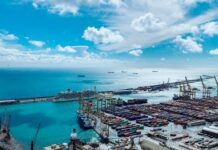
Key developments within the container shipping industry will see shipping lines transporting far more LCL (less than container load) cargoes and the development of just-in-case logistics following the global pandemic and the accelerated development of digitalised supply chains.
Container shipping lines will likely create digital twins in the way that financial institutions or car manufacturers have to make the companies more agile in the face of rapid economic and supply chain changes.
Singapore-based Nidhi Gupta, CEO and co-founder of Portcast, with Dr. Lingxiao Xia, believes that the container shipping industry and supply chain logistics is at an “inflection point” in its development, as the pandemic has highlighted the weak links in the supply chain, but also the direction the major stakeholders need to take in the future.
Speaking exclusively to Container News, Gupta said, “If you look at ships on a world map it’s like a stock exchange,” she added, “data is value,” pointing out that if you are aware of what goods are in demand and where they are headed then you can understand economic patterns.
Gupta believes that all sections of the logistics sector are looking at developing dynamic supply chains, the carriers need to develop faster online booking systems with dynamic pricing in addition to fleet operational data including port congestion data, while freight forwarders need to develop visibility of cargo movement and condition, “they must differentiate themselves from other forwarders.”
Efficient forwarders and those that operate in a regional or cargo niche will remain, but otherwise there is likely to be considerable consolidation in the freight forwarding business. “It will be the efficient players that remain,” believes Gupta.
Companies like Kuehne + Nagel are agile, they can produce products within three months, “They are like start-ups,” said Gupta, but the drive for efficiency must come from the top down.
For freight forwarders, the future is about doing more with less and making sure they get a better return on their investment, for the manufacturers there is a need for them to have greater control on their supply chains.
As a result, supply chains are becoming more complex, the Portcast CEO argued, “Near-shoring is definitely happening, regional supply chains have been shown to be necessary as a result of the pandemic,” she said. Adding, “Global supply chains will continue, but manufacturers will need to spread their supply chains and that will increase the complexity, they will need to decide where to locate inventory, it will no longer be just-in-time logistics, but just-in-case.”
All the stakeholders in the logistics environment will need to adapt further to the need for more LCL cargo as consumer demand for rapid delivery increases and the regionally-based inventory will help to meet that demand, “But in this environment performance metrics and dynamic decision making will make KPI’s [key performance indicators] critical, delivery of goods will be much faster, but the margins will be much thinner,” added Gupta.
Managing Editor
Nick Savvides





